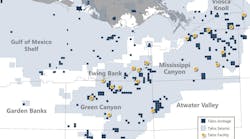Bruce Beaubouef * Managing Editor
WASHINGTON, DC – The Biden administration has introduced a new proposed five-year plan for offshore oil and gas leasing, and it will not include any sales in 2024 and will feature just three in the final four years.
The new proposed plan represents, as stated by the US Department of Interior (DOI), “the fewest oil and gas lease sales in [US] history.”
The DOI says that the Proposed Final Program and Final Programmatic Environmental Impact Statement for the 2024–2029 National Outer Continental Shelf Oil and Gas Leasing Program is “consistent with the requirements of the Inflation Reduction Act (IRA) concerning offshore conventional and renewable energy leasing.”
The Proposed Final Program includes a maximum of three potential oil and gas lease sales in the Gulf of Mexico Program Area scheduled in 2025, 2027 and 2029. The DOI press release stated that “In compliance with the terms of the IRA, these three proposed lease sales are the minimum number that will enable the Interior Department to continue to expand its offshore wind leasing program through 2030.”
The DOI says that the reduction of the next National OCS Program to a maximum of three potential lease sales will bring the federal offshore oil and gas program in line with the Biden-Harris administration’s goal of net-zero emissions by 2050 and meet the IRA’s requirements for future offshore renewable energy leasing.
“The Biden-Harris administration is committed to building a clean energy future that ensures America’s energy independence,” said Secretary of the Interior Deb Haaland. “The Proposed Final Program, which represents the smallest number of oil and gas lease sales in history, sets a course for the Department to support the growing offshore wind industry and protect against the potential for environmental damage and adverse impacts to coastal communities.”
The DOI also said that areas considered for leasing and number of potential lease sales in the 2024-2029 Proposed Final Program have been significantly narrowed from the previous administration’s original proposal of 47 lease sales off all coastal areas in the US over a five-year period.
The IRA does not allow the Bureau of Ocean Energy Management (BOEM) to issue a lease for offshore wind development unless the agency has offered at least 60 million acres for oil and gas leasing on the OCS in the previous year.
The DOI says that the three potential sales in the Proposed Final Program will enable the department’s offshore wind energy program to continue to issue offshore wind leases, ensuring continued progress towards the administration’s goal of 30 gigawatts of offshore wind by 2030.
The DOI also says that the proposed National OCS Program will limit leasing to the Gulf of Mexico OCS, where there is existing production and infrastructure. This area includes the portions of the Western, Central and Eastern GOM planning areas not currently under presidential withdrawal.
Publication of the Proposed Final Program and Final Programmatic EIS in the Federal Register will initiate a 60-day waiting period that is required before the Secretary can formally approve the program and finalize the Record of Decision.
BOEM will also publish a Call for Information and Nominations (Call) regarding the potential future Gulf of Mexico oil and gas lease sales included in the 2024–2029 National OCS Program in the Federal Register. The publication of the Call will initiate a 30-day comment period, during which BOEM will seek comments from industry on interest in the areas proposed for leasing, including nominations or indications of interest in specific lease blocks within the area.
BOEM will also publish a Notice of Intent to prepare a Programmatic EIS in the Federal Register, to analyze the potential impacts of a representative lease sale in the GOM during the 2024–2029 National OCS Program, as well as ongoing and potential associated site and activity-specific oil- and gas-related activity approvals.
The proposed five-year leasing plan drew criticism from industry groups.
The American Petroleum Institute (API) released a response from API President and CEO Mike Sommers, who said that: “At a time when inflation runs rampant across the country, the Biden administration is choosing failed energy policies that are adding to the pain Americans are feeling at the pump. This restrictive offshore leasing program is the latest tactic in a coordinated strategy to reduce energy production, ultimately weakening America’s energy dominance, limiting consumers access to affordable reliable energy and compromising our ability to lead on the global stage. For decades, we’ve strived for energy security and this administration keeps trying to give it away.”
Jeff Eshelman, President and CEO of the Independent Petroleum Association of America (IPAA), said: “IPAA is disappointed by the content of the Biden Administration’s offshore five-year leasing program released today. It’s clear that the Biden Administration has chosen to align its policy decisions with environmental activists rather than put the best interest of American consumers first. A plan with only three leases in five years will not only hamper American production but jeopardizes our energy security and will result in hundreds of millions of dollars of lost revenue to coastal states and the federal treasury. The sad truth is that this plan will force the US to get oil from other nations rather than develop American resources by American companies.”
09.29.2023





